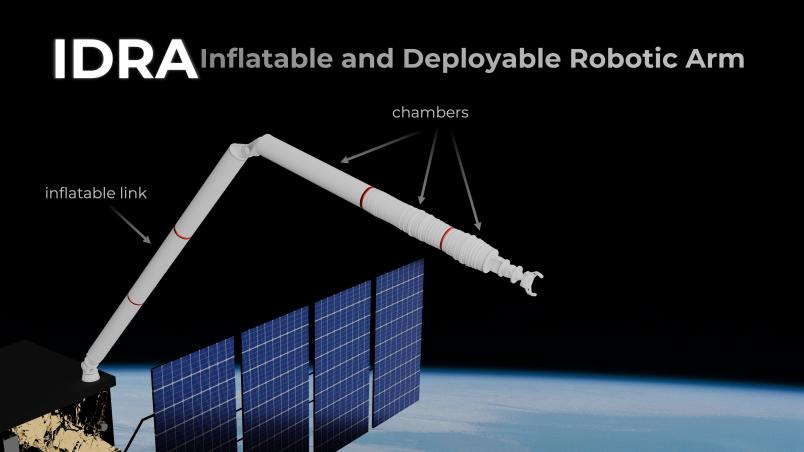
An Inflatable Robotic Arm for Extreme Environments

Deplotic, a spin-off of Politecnico di Torino, developed inflatable robotic arms that can deploy and retract. Initially designed for space applications, these arms are also suitable for terrestrial contexts where reduced volume and weight become essential. The patented technology originates from research in orbital robotics conducted at the Department of Mechanical and Aerospace Engineering-DIMEAS at Politecnico di Torino.
“For around six years, our research team has focused on unconventional robotics for hostile environments, including space, gas and nuclear sectors. Our work on orbital robotics – in particular, robotic arms that perform operations in orbit – led us to develop robots with inflatable arms that are easier to transport and deploy when operating in extreme conditions such as space,” explains Stefano Mauro, Professor at DIMEAS and co-founder of Deplotic. “We are currently in the market development phase, looking for partnerships and contacts with investors.”
The research team first built a prototype to validate the innovative concept. This was followed by two Proof of Concept grants: one from Compagnia di San Paolo and the other from NODES (Nord-Ovest Digitale E Sostenibile - “Digital and Sustainable North-Western Italy”) Innovation Ecosystem funded under Italy’s National Recovery and Resilience Plan (PNRR). These funds enabled the project to advance and led to the creation of the spin-off. With the support of I3P, the Incubator of Politecnico di Torino, a business plan was developed to bring the product to market by 2027. In the meantime, Deplotic has taken part in several startup competitions, earning notable recognition. Most recently, the startup won the 2023 Intellectual Property Award (IPA) in The Future from the Space category and the 2024 Italian National Innovation Award in the Industrial category.
What lies at the heart of Deplotic’s innovation? “Our technology enables precise control of both the deployment and retraction phases of the inflatable structure,” explains Pierpaolo Palmieri, CEO of Deplotic. “Our robotic arm offers an innovative response to today’s challenges in the space sector, such as debris removal and satellite maintenance. It improves missions’ efficiency and contributes to a more sustainable future for space exploration.”
The deployment and retraction system is not only intended for space applications. Thanks to its high stowage ratio, low mass, and high applicable force, the arm is suitable for use in confined or weight-sensitive environments on Earth, such as inside storage tanks or mounted on drones. Another promising application is in collaborative robotics, where inflatable “soft” components can increase safety during interactions with human operators.
“Today,” Mauro and Palmieri conclude, “we are ready to work with companies on terrestrial applications and adapt the technology to meet specific requirements. As for space, our first in-orbit trials are planned for 2027, and we are open to collaboration in this field as well, with a longer-term development outlook.”